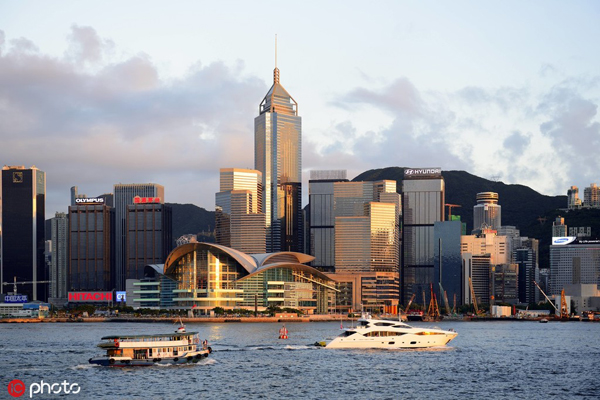Hong Kong Special Administrative Region


Major social and economic indicators (2018)
Area: 1,106.66 sq km
Population: 7,482,500
Gross domestic product (GDP): $364.8 billion
GDP per capita: $48,958
Value of total merchandise trade: $1.14 trillion
Value of export: $533.1billion
Value of import: $605.3 billion
Industrial structure (% of GDP):
Primary industry (agriculture, forestry, animal husbandry, fishery): 0.1% of GDP
Secondary Industry (industrial and construction): 7.5% of GDP
Tertiary industry (service industry): 92.4% of GDP
Port cargo throughput: 258.5 million tons
Passenger throughput:
Visitors received: 65.15 million passenger trips
Hong Kong International Airport: 74.7 million passenger trips
Note: the above figures are provided by the relevant government departments of Hong Kong Special Administrative Region.
Industries
Hong Kong has been rated as "the world's freest economy" for 25 consecutive years by the authoritative Heritage Foundation based in Washington, the United States.
The region is the most service-dominated economy in the world, with the service industry accounting for more than 90 percent of its GDP. According to statistics from the World Trade Organization, Hong Kong is the world's 15th-largest exporter of services.
Hong Kong has four pillar industries – financial services, tourism, trade and logistics, and professional and business support services.
The region has long been regarded as an international financial center, according to the Global Financial Centers Index (GFCI) published since March 2007. By the end of 2017, Hong Kong was the third-largest stock market in Asia and the sixth-largest in the world by market capitalization.
GFCI is a ranking of the competitiveness of financial centers based on a number of existing indices in combination with a regular questionnaire of senior industry figures from around the world by Z/Yen Group based in London, the United Kingdom.
In 2017, the trade and logistics industry made up about 21.5 percent of Hong Kong's GDP, while transport services accounted for 29.2 percent of the region's service exports.
Transport
Hong Kong is one of the main transport hubs in Asia. Hong Kong International Airport has been the world's busiest airport since 2006. It provides about 1,100 scheduled passenger and all-cargo flights a day between Hong Kong and about 190 destinations worldwide, including 50 cities on the Chinese mainland. Most cities in Asia are within five hours' flight from Hong Kong.
There are nine container terminals in Hong Kong, with 24 berths with an annual container handling capacity of more than 20 million TEUs (twenty-foot equivalent unit). In 2018, Hong Kong was the seventh-largest container port in the world.
The Hong Kong-Zhuhai-Macao Bridge, the world's longest cross-sea bridge, took nine years to construct and was formally opened on Oct 24, 2018. It links the three different customs areas of Hong Kong, Macao and Zhuhai in Guangdong province, and connects the eastern and western sides of the Pearl River estuary.
The Guangzhou-Shenzhen-Hong Kong Express Rail Link is a high-speed railway line that connects Beijing and Hong Kong (Kowloon) via Guangzhou and Shenzhen in Guangdong province. The Hong Kong section of the railway connects Shenzhen to Hong Kong (West Kowloon Railway Station) and significantly shortens travel time between the main cities of the Guangdong-Hong Kong-Macao Greater Bay Area.
Hong Kong has four overland border crossings to the Chinese mainland: Lok Ma Chau Loop, Man Kam To, Sha Tau Kok, and Shenzhen Bay border areas. The average number of daily cross-boundary vehicles going through the four overland border crossings is about 43,000.
Role in the Greater Bay Area
According to the development plan of the Guangdong-Hong Kong-Macao Greater Bay Area, Hong Kong is positioned as one of the area's four core cities. It is expected to: consolidate and enhance Hong Kong's position as an international financial, shipping, trade and aviation center; strengthen its status as a global offshore renminbi business hub and as an international asset management and risk management center; promote the development of high-end and high value-added financial, commercial and trading, logistics and professional services; develop innovation and technology industries; foster emerging industries; build itself into an international legal and dispute-resolution services center in the Asia Pacific region, and a more competitive international metropolis.
Key words for Hong Kong in the Greater Bay Area
Platform for cultural exchange:
Serve as a platform for cultural exchange between East and West, and promote the fine traditions of Chinese culture.
Entrepreneurship and employment:
Help Hong Kong youth to start businesses or seek employment in the Greater Bay Area through means such as the Youth Development Fund.
International financial center:
Provide services such as investment, financing and consultation to help mainland enterprises “go global”.
Special cooperation platform:
Hong Kong-Shenzhen Innovation and Technology Park
MOST POPULAR
- 1 Record trade bodes well globally
- 2 China updates Catalogue of Encouraged Industries for Foreign Investment
- 3 China's commerce ministry to boost consumption, opening-up in 2026
- 4 China's auto production, sales rank first globally for 17th consecutive year
- 5 China remains world's largest online retail market for 13th straight year







